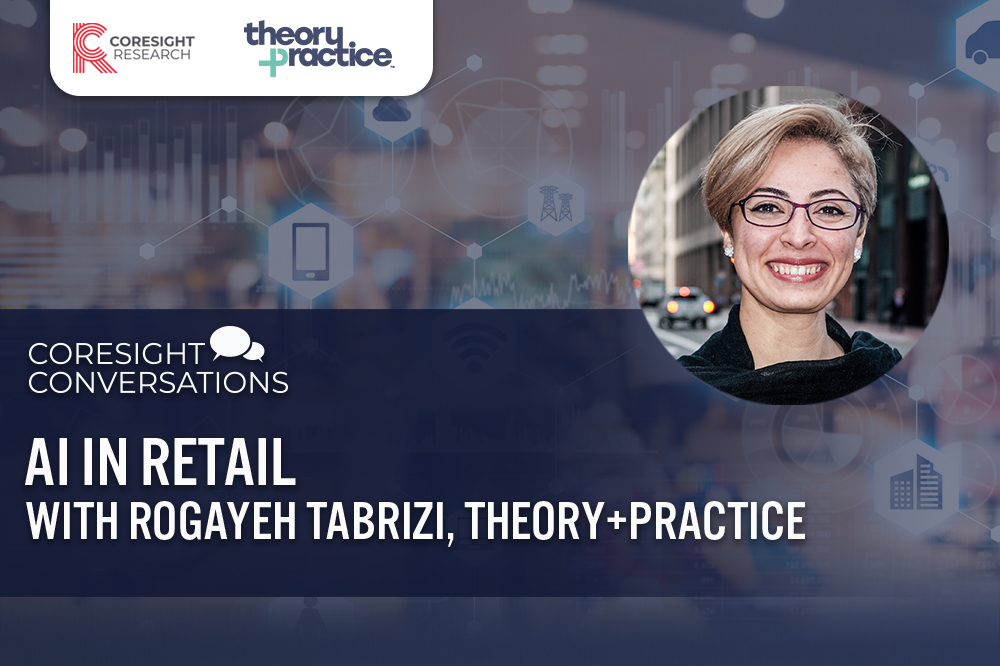
Nitheesh NH
We present key insights from a Coresight Research webinar on September 15, 2020, in which Theory+Practice CEO and Cofounder Rogayeh Tabrizi discussed how AI can be best leveraged to understand and predict consumer behavior and how it is being deployed during the Covid-19 crisis. The webinar was hosted by Deborah Weinswig, CEO and Founder of Coresight Research.
Theory+Practice is an information and technology firm that makes sense of data complexity through analysis, AI solutions and behavioral economics. It works with companies as a third-party data analytics group as well as in-house data science teams.
AI: Proper Application and Understanding Is Essential
Tabrizi explained that asking the right questions is essential for effective use of AI in optimizing operations. AI algorithms are often programmed with integrated mistakes, such as analyzing the wrong data—an error that is often due to under-planned roadmaps on obtaining the required insights. In order to correct this, Tabrizi explained that having a complete understanding of data will help to avoid inaccurate or ineffective uses and interpretations of insights.
Tabrizi discussed the inherent risk associated with data analysis—data is littered with biases, holes and inaccuracies that must be corrected as far as possible in order to obtain accurate analysis. Although it is deemed impossible to avoid bias altogether, Tabrizi identified two main ways in which companies can ensure the collection of accurate and largely objective data.
1. Intellectual diversity—Drawing on wisdom from many a range of experts across different fields provides multiple perspectives that might otherwise be missed. Tabrizi highlighted the importance of having data analysts from different academic fields, including physics, biology, economics and sociology. Each group has a different way of organizing and analyzing data—when pooled together this can create a diverse AI model to counteract bias and subjectivity as far as possible.
2. Testing—Safeguards should be included in AI models. AI models are never perfect, thus the ability to adapt them for changing environments is highly important. Tabrizi explained that AI is best optimized when it is released through a series of beta platforms that allow data scientists to correct gaps and holes. Companies must be able to run tests to establish what works and what does not, in order to produce the optimal AI machine.
[caption id="attachment_116679" align="aligncenter" width="700"] Deborah Weinswig and Rogayeh Tabrizi discuss the potential impacts of AI on the retail industry
Deborah Weinswig and Rogayeh Tabrizi discuss the potential impacts of AI on the retail industry
Source: Coresight Research[/caption] Retail Applications in the Covid-19 Era With the onset of coronavirus in early 2020, Tabrizi highlighted that AI has been put to the test in response to the massive increase in online shopping. Tabrizi discussed a common struggle in the application of AI to brick-and-mortar retail for companies that operated primarily in-store prior to the pandemic.
 Deborah Weinswig and Rogayeh Tabrizi discuss the potential impacts of AI on the retail industry
Deborah Weinswig and Rogayeh Tabrizi discuss the potential impacts of AI on the retail industrySource: Coresight Research[/caption] Retail Applications in the Covid-19 Era With the onset of coronavirus in early 2020, Tabrizi highlighted that AI has been put to the test in response to the massive increase in online shopping. Tabrizi discussed a common struggle in the application of AI to brick-and-mortar retail for companies that operated primarily in-store prior to the pandemic.
- Tabrizi has witnessed a lack of customer data for retailers that prioritized in-store shopping. These retailers are now working to rapidly increase data collection. Many of these companies had not previously experienced a push to implement AI as in-store applications of the technology are fairly limited.
- Nevertheless, there are in-store AI applications in development, such as the ability to deduce a customer’s emotional reactions to products collect information on the shopping experience. This technology is in the early stages but Tabrizi eventually expects it to be widely applied to enhance retail experiences.
- Trying to apply data as customers shift between in-store and online shopping preferences is also challenging. The attraction and retention of customers whose demands have shifted greatly over the quarantine period is a vastly different game and requires quick adjustment from retailers.